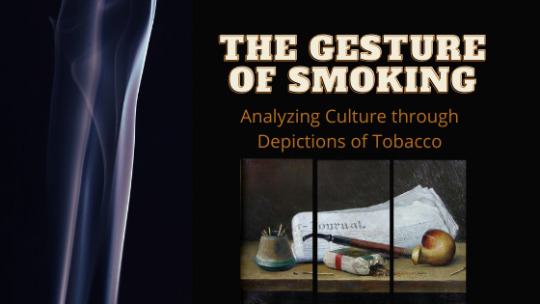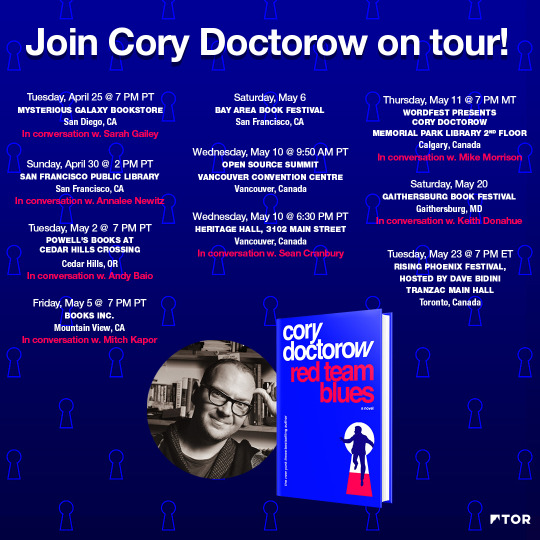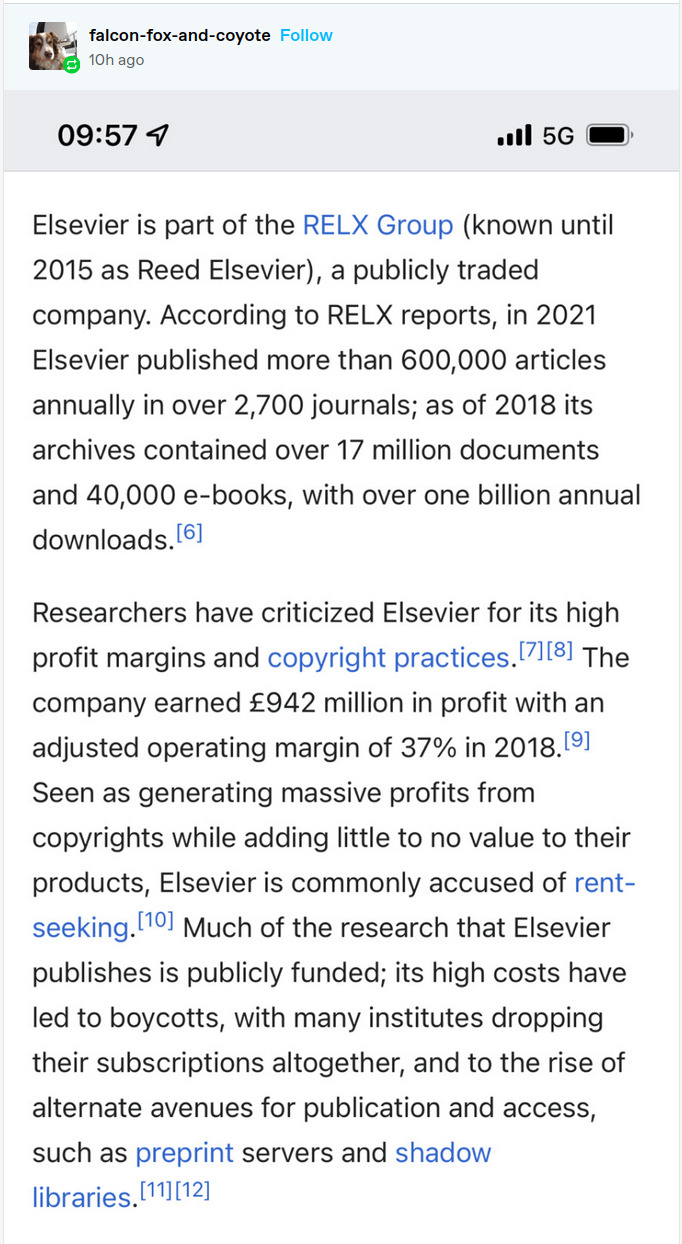#public scholarship
Text
Tobacco Talk: How to Share Your Research
Tobacco Talk: How to Share Your Research
Just puffand aim a beamof smoke at nothingbut the fact of satisfaction …What seems a treasurein this world is notfor us to measure.Sometimes it’s quiteenough to marvelat a dream that turnedmere leaves into a pleasure.– Samuel Hazo, “When the Evening Gets Down to Cigars”Occasional verse delivered at a meeting of the Rascals, Rogues, and Rapscallions.
The students in my honors class are finishing…

View On WordPress
#Conferences#Father the Flame#Hermeneutics#Love#Pipe Smoking#Pipemaking#Poetry#Public Humanities#Public Scholarship#Samuel Hazo#Smoking#The Gesture of Smoking
5 notes
·
View notes
Text
My parents dropping that they refinanced the house and spent 500k over the past seven years on my brothers rehab all for him to get a dui and refuse to hold a job ❤️
#and what was I doing at the time? getting scholarships at an in-state public school#lots to think about there
9 notes
·
View notes
Text
anyone have tips of how to convince uchicago to give me tons of money for no reason but i really want them to.
#incoherents#i think getting an MA at the university of chicago would fix many parts of me#but the offer seems more like a 'fuck you youre not good enough but well let you come if you pay us more than you ever could'#maybe i could ask to defer so i coulr apply for fellowships next year???#but reasons they should let me in 1.) i have over a 3.9 and they already accepted me and obviously think of money werent involved id be a#good candidate 2.) I was only able to complete undergrad degree bc i got a scholarship for being technically homeless#3.) reason why they probably thought I werent ready for phd to defer was probably the lack of research experience publication#which was largely due to the pandemic and i need an MA to fix that#4.) uhh i really want them too 🥺🥺 it's been over a decade of wanting to go there......#5.) im so nice :)#i should message misha collins and ask him to convince them lmao#SO frustrating to me he went I uchicago for undergrad and i didnt. bet my stats were better than his.
8 notes
·
View notes
Text
Ostromizing democracy

Friday (May 5), I’ll be at the Books, Inc in Mountain View with Mitch Kapor for my novel Red Team Blues; and this weekend (May 6/7), I’ll be in Berkeley at the Bay Area Bookfest.

You know how “realist” has become a synonym for “asshole?” As in, “I’m not a racist, I’m just a ‘race realist?’” That same “realism” is also used to discredit the idea of democracy itself, among a group of self-styled “libertarian elitists,” who claim that social science proves that democracy doesn’t work — and can’t work.
If you’d like an essay-formatted version of this post to read or share, here’s a link to it on pluralistic.net, my surveillance-free, ad-free, tracker-free blog:
https://pluralistic.net/2023/05/04/analytical-democratic-theory/#epistocratic-delusions
You’ve likely encountered elements of this ideology in the wild. Perhaps you’ve heard about how our cognitive biases make us incapable of deliberating, that “reasoning was not designed to pursue the truth. Reasoning was designed by evolution to help us win arguments.”
Or maybe you’ve heard that voters are “rationally ignorant,” choosing not to become informed about politics because their vote doesn’t have enough influence to justify the cognitive expenditure of figuring out how to cast it.
There’s the “backfire effect,” the idea that rational argument doesn’t make us change our minds, but rather, drives us to double-down on our own cherished beliefs. As if that wasn’t bad enough, there’s the Asch effect, which says that we will change our minds based on pressure from the majority, even if we know they’re wrong.
Finally, there’s the fact that the public Just Doesn’t Understand Economics. When you compare the views of the average person to the views of the average PhD economist, you find that the public sharply disagrees with such obvious truths as “we should only worry about how big the pie is, not how big my slice is?” These fools just can’t understand that an economy where their boss gets richer and they get poorer is a good economy, so long as it’s growing overall!
That’s why noted “realist” Peter Thiel thinks women shouldn’t be allowed to vote. Thiel says that mothers are apt to sideline the “science” of economics for the soppy, sentimental idea that children shouldn’t starve to death and thus vote for politicians who are willing to tax rich people. Thus do we find ourselves on the road to serfdom:
https://www.cato-unbound.org/2009/04/13/peter-thiel/education-libertarian/
Other realists go even further, suggesting that anyone who disagrees with orthodox (Chicago School) economists shouldn’t be allowed to vote: “[a]nyone who opposes surge pricing should be disenfranchised. That’s how we should decide who decides in epistocracy.”
Add it all up and you get the various “libertarian” cases for abolishing democracy. Some of these libertarian elitists want to replace democracy with markets, because “markets impose an effective ‘user fee’ for irrationality that is absent from democracy.
Others say we should limit voting to “Vulcans” who can pass a knowledge test about the views of neoclassical economists, and if this means that fewer Black people and women are eligible to vote because either condition is “negatively correlated” with familiarity with “politics,” then so mote be it. After all, these groups are “much more likely than others to be mistaken about what they really need”:
https://bleedingheartlibertarians.com/2015/03/the-demographic-argument-for-compulsory-voting-with-a-guest-appearance-by-the-real-reason-the-left-advocates-compulsory-voting/
These arguments and some of their most gaping errors are rehearsed in an excellent Democracy Journal article by Henry Farrell, Hugo Mercier, and Melissa Schwartzberg (Mercier’s research is often misinterpreted and misquoted by libertarian elitists to bolster their position):
https://democracyjournal.org/magazine/68/the-new-libertarian-elitists/
The article is a companion piece to a new academic article in American Political Science Review, where the authors propose a new subdiscipline of political science, Analytical Democracy Theory:
https://www.cambridge.org/core/journals/american-political-science-review/article/analytical-democratic-theory-a-microfoundational-approach/739A9A928A99A47994E4585059B03398
What’s “Analytical Democracy Theory?” It’s the systematic study of when and how collective decision-making works, and when it goes wrong. Because the libertarian elitists aren’t completely, utterly wrong — there are times when groups of people make bad decisions. From that crumb of truth, the libertarian elitists theorize an entire nihilistic cake in which self-governance is impossible and where we fools and sentimentalists must be subjugated to the will of our intellectual betters, for our own good.
This isn’t the first time libertarian political scientists have pulled this trick. You’ve probably heard of the “Tragedy of the Commons,” which claims to be a “realist” account of what happens when people try to share something — a park, a beach, a forest — without anyone owning it. According to the “tragedy,” these commons are inevitably ruined by “rational” actors who know that if they don’t overgraze, pollute or despoil, someone else will, so they might as well get there first.
The Tragedy of the Commons feels right, and we’ve all experienced some version of it — the messy kitchen at your office or student house-share, the litter in the park, etc. But the paper that brought us the idea of the Tragedy of the Commons, published in 1968 by Garrett Hardin in Science, was a hoax:
https://memex.craphound.com/2019/10/01/the-tragedy-of-the-commons-how-ecofascism-was-smuggled-into-mainstream-thought/
Hardin didn’t just claim that some commons turned tragic — he claimed that the tragedy was inevitable, and, moreover, that every commons had experienced a tragedy. But Hardin made it all up. It wasn’t true. What’s more, Hardin — an ardent white nationalist — used his “realist’s account of the commons to justify colonization and genocide.
After all, if the people who lived in these colonized places didn’t have property rights to keep their commons from tragifying, then those commons were already doomed. The colonizers who seized their lands and murdered the people they found there were actually saving the colonized from their own tragedies.
Hardin went on to pioneer the idea of “lifeboat ethics,” a greased slide to mass-extermination of “inferior” people (Hardin was also a eugenicist) in order to save our planet from “overpopulation.”
Hardin’s flawed account of the commons is a sterling example of the problem with economism, the ideology that underpins neoclassical economics:
https://pluralistic.net/2022/10/27/economism/#what-would-i-do-if-i-were-a-horse
Economism was summed up in by Ely Devons, who quipped “”If economists wished to study the horse, they wouldn’t go and look at horses. They’d sit in their studies and say to themselves, ‘What would I do if I were a horse?’”
Hardin asked himself, “If I were reliant upon a commons, what would I do?” And, being a realist (that is, an asshole), Hardin decided that he would steal everything from the commons because that’s what the other realists would do if he didn’t get there first.
Hardin didn’t go and look at a commons. But someone else did.
Elinor Ostrom won the Nobel for her work studying the properties of successful, durable commons. She went and looked at commons:
https://www.onthecommons.org/magazine/elinor-ostroms-8-principles-managing-commmons
Ostom codified the circumstances, mechanisms and principles that distinguished successful commons from failed commons.
Analytical Democratic Theory proposes doing for democratic deliberation what Ostrom did for commons: to create an empirical account of the methods, arrangements, circumstances and systems that produce good group reasoning, and avoid the pitfalls that lead to bad group reasoning. The economists’ term for this is microfoundations: the close study of interaction among individuals, which then produces a “macro” account of how to structure whole societies.
Here are some examples of how microfoundations can answer some very big questions:
Backfire effects: The original backfire effect research was a fluke. It turns out that in most cases, people who are presented with well-sourced facts and good arguments change their minds — but not always.
https://link.springer.com/article/10.1007/s11109-019-09528-x
Rational ignorance: Contrary to the predictions of “rational ignorance” theory, people who care about specific issues become “issue publics” who are incredibly knowledgeable about it, and deeply investigate and respond to candidates’ positions:
https://www.tandfonline.com/doi/pdf/10.1080/08913810608443650
Rational ignorance is a mirage, caused by giving people questionnaires about politics in general, rather than the politics that affects them directly and personally.
“Myside” bias: Even when people strongly identify with a group, they are capable of filtering out “erroneous messages” that come from that group if they get good, contradictory evidence:
https://www.hup.harvard.edu/catalog.php?isbn=9780674237827
Majority bias: People are capable of rejecting the consensus of majorities, when the majority view is implausible, or when the majority is small, or when the majority is not perceived as benevolent. The Asch effect is “folklore”: yes, people may say that they hold a majority view when they face social sanction for rejecting it, but that doesn’t mean they’ve changed their minds:
https://alexandercoppock.com/guess_coppock_2020.pdf
Notwithstanding all this, democracy’s cheerleaders have some major gaps in the evidence to support their own view. Analytical Democratic Theory needs to investigate the nuts-and-bolts of when deliberation works and when it fails, including the tradeoffs between:
“social comfort and comfort in expressing dissent”:
https://sci-hub.se/10.1016/S0065-2601(05)37004-3
“shared common ground and some measure of preexisting disagreement”:
https://sci-hub.st/10.1037/0022-3514.91.6.1080
“group size and the need to represent diversity”:
https://www.nicolas.claidiere.fr/wp-content/uploads/DiscussionCrowds-Mercier-2021.pdf
“pressures for conformity and concerns for epistemic reputation”:
https://academic.oup.com/princeton-scholarship-online/book/30811
Realism is a demand dressed up as an observation. Realists like Margaret Thatcher insisted “there is no alternative” to neoliberalism, but what she meant was “stop trying to think of an alternative.” Hardin didn’t just claim that some commons turned tragic, he claimed that the tragedy of the commons was inevitable — that we shouldn’t even bother trying to create public goods.
The Ostrom method — actually studying how something works, rather than asking yourself how it would work if everyone thought like you — is a powerful tonic to this, but it’s not the only one. One of the things that makes science fiction so powerful is its ability to ask how a system would work under some different social arrangement.
It’s a radical proposition. Don’t just ask what the gadget does: ask who it does it for and who it does it to. That’s the foundation of Luddism, which is smeared as a technophobic rejection of technology, but which was only ever a social rejection of the specific economic arrangements of that technology. Specifically, the Luddites rejected the idea that machines should be “so easy a child could use them” in order to kidnap children from orphanages and working them to death at those machines:
https://pluralistic.net/2023/03/20/love-the-machine/#hate-the-factory
There are sf writers who are making enormous strides in imagining how deliberative tools could enable new democratic institutions. Ruthanna Emrys’s stunning 2022 novel “A Half-Built Garden” is a tour-de-force:
https://pluralistic.net/2022/07/26/aislands/#dead-ringers
I like to think that I make a small contribution here, too. My next novel, “The Lost Cause,” is at root a tale of competing group decision-making methodologies, between post-Green New Deal repair collectives, seafaring anarcho-capitalist techno-solutionists, and terrorizing white nationalist militias (it’s out in November):
https://us.macmillan.com/books/9781250865939/the-lost-cause

Catch me on tour with Red Team Blues in Mountain View, Berkeley, Vancouver, Calgary, Toronto, DC, Gaithersburg, Oxford, Hay, Manchester, Nottingham, London, and Berlin!


[Image ID: A lab-coated scientist amidst an array of chemistry equipment. His head has been replaced with a 19th-century anatomical lateral cross-section showing the inside of a bearded man's head, including one lobe of his brain. He is peering at a large flask half-full of red liquid. Inside the liquid floats the Capitol building.]
#pluralistic#epistocracy#analytical democracy#echo chambers#issue publics#stop confusing the issue with facts#cognitive elites#rational ignorance#backfire effects#analytical democratic theory#scholarship#political science#democracy#epistemic democrats#microfoundations#libertarians#elinor ostrom#ostrom#deliberation
42 notes
·
View notes
Text
speaking of underrated historical figures you know who never gets featured in frev stuff ever?? augustin robespierre. i swear you could watch all the most popular frev movies and not even know maximilien robespierre HAD a brother. much less that that brother was at least somewhat important. didnt even merit an ALLUSION in the new napoleon movie even though it showed that bizarre version of thermidor. in lrf he is just physically not present when he should be. he might not have been the most notable politician but... that even the incredible courage and loyalty of his decision to share his brother's fate is so forgotten even in accounts that center his brother... it's a little heartbreaking to me
#charlotte is too but thats a little more understandable. she doesnt want you to know anything about her either#frev#augustin robespierre#im mostly talking about historical fiction/the public consciousness here but i wish there was more scholarship on him as well#i swear i would have forgiven the napoleon movie everything if bonbon had been in it. just 1 little glimpse. but life isnt always kind
2 notes
·
View notes
Text
i swear to god predoc scholarships will be the fucking end of me oh god i almost lost it completely for a bit, i think i need a defribilator
#basically#yesterday i got an email noticing me that something was missing in my application for the predoc scholarship by the CAM (madrid autonomous#community)#the thing is. the thesis director was the one who had to fill in the application so i cannot access it#i sent it to my thesis director#and today i see i have three emails from her. i get very nervous#i open them and it's all resent emails between her and the CAM office#she is telling them she cannot find what am i missing that they please contact them#and the CAM replying to her after i was on the brink of a heart attack: 'lol we fucked up we didn't have him in the correct excel.#he's actually fine'#YOU FUCKERS#I'M ABOUT TO LOSE IT ALL I CANNOT DO THIS ANYMORE#all so they tell me in a couple months that i didn't get selected. again. xd#doing a phd in spain is just. willingly wanting to be tortured by public administration and endure it because you want to have a future#before giving up and becoming a funcionario i guess#i'm at my breaking point
3 notes
·
View notes
Text

✅ certified Marie de France post ✅
13 notes
·
View notes
Note
Hello it is me, your friendly east bay anon, anon no longer! I did actually go and create a whole new Tumblr account that is Not known to my childhood friends so that I could interact without being perceived, this was possibly entirely motivated by the fact that my ao3 is linked to that Tumblr and it was keeping me from commenting on RPF things for fear of perceival, and i felt bad that i wasn't interacting w your niche fics that i love. But the AO3 invite is in the mail, so now I'm just here.
EAST BAY ANON REVEAL!! HELLO!!
honestly extremely valid I pray every day my non-fandom college friends are too busy with their NGOs and non-profits and grad programs to remember tumblr exists, otherwise I'd be having some truly horrendous conversations rn...lol. Glad you de-anoned welcome to the shitshow etc etc looking forward to having more conversations with you in the future!!
#hope it is ok that i made this public i felt everyone should have access to east bay scholarship#cage replies#localapparent#east bay anon#wait did you delete. no blog is showing up when i click on your username#wow i have been visited by the ghosts of the uc berkeley hyenas
6 notes
·
View notes
Text
The anti-intellectualism on this website truely knows no bounds.
#sorry this post was sparked by someone who was like ‘if you went to an ivy legue school you’re a ruch fuck’#and then went on to assume that none of them know how to wash dishes or that they all want to be politicians#well i went to an ivy on a full ride scholarship which i worked my ass off for to study structural engineering#and i want to work designing bridges railroads and other public intrastructure#also rn i’m living paycheck to paycheck#so literally go fuck yourself.#my classes had a lot of rich assholes in them yeah but there were also a ton of kids who were also on scholarship or in exchange programs#and i’m so greatful that i got to go to such a resource rich university and meet so many wonderful people there#sorry you met a business major once and assumed all ivy legue grads were like that. but the largest major at my university was agriculture#me
3 notes
·
View notes
Text
Making a work on Ao3 that gives some info about my Bully OCs so look out for that
#i would live to release it this week or the next but I don't like giving myself public deadlines#i have some art of my characters but I don't feel comfortable posting them bc my art is TRASH holy shit#i'll try to be as discriptive as I can#bully cce#bully scholarship edition#canis canem edit#i can't edit the typos bc i'm on mobile just ignore them
10 notes
·
View notes
Text

Phyllis "Pam" Velona Broom-Walker
B. January 12th 1940 in Jamaica
Toronto, Ontario
Phyllis was an educator, storyteller, Black History public advocate, enameling artist, radio host and actress on Treehouse Television.
In the 1980s she earned her Master's in Education at U of T, and set up a Black History Club at her school, giving up her lunch breaks to host.
The Phyllis Velona Walker Scholarship is funded by her estate at Woodsworth College, University of Toronto.
#Phyllis Pam Velona Broom-Walker#Phyllis Velona Walker#Jamaica#Toronto#Ontario#educator#storyteller#Black History public advocate#radio host#enameling artist#actress#yoga practitioner#phyllis velona walker scholarship#beloved aunt#may she rest in peace#<3
35 notes
·
View notes
Text
Tomorrow is my last day of highschool forever.
#jt#idk this isnt really a joy or a vent#im gonna miss my friends bro#whatever that one post says about emo kids sitting jn each other's laps and talking about emo stuff nobody cares about#i go to a strange really small public school#and ive like genuinely enjoyed my time in highschool bc my peers were all stange and and not the typical bully type#in the best way possible ofc#some of them suck sure but theres so much good#anyways hope the principal gets hit by a big meteor#oh also i got a SCHOLARSHIP!!!!!!#happy about that#good night
3 notes
·
View notes
Text
can't wait to pay 160k usd for an illustration degree!!
#i'm lucky enough to live in the state w the us's only public art school AND STILL i. like an idiot. managed to fall madly in love#w a private one in my hometown. war and hate on planet earth i wanted to like massart i wanted to go to school in#boston i really did. i'm never getting out of this fucking town#if i don't get a shitton of scholarship for this school i'm not going to college at all. i've decided. i'll be disowned but idc i'm not#going anywhere else and getting into debt just to be miserable for a few years#romeo.txt
5 notes
·
View notes
Text






heartwarming!:
turns out dunking on Elsevier is one of those rare ways to bring tunglr dot hell together in unity, harmony, and incandescent seething hatred
#hellsite (affectionate)#long post#pirating from elsevier and the other big academic publishers is ALWAYS not just ethically permissible but a moral good#because they've perverted copyright to the point where it's not actually possible to 'steal' from the authors or peer reviewers#anyone who contributed useful creative or scientific work has been extorted into doing it free or even paying for 'partial open access'#and their institutions have to pay through the nose to rent it back - in bundled plans a cable company would blush at#if you stomp into one of the core domains of fair use and put everyone in a chokehold that eliminates every legitimate purpose of copyright#and are no longer even pretending that a single contributor to 'the progress of science & the useful arts' gets any compensation from it#then yeah it's a moral good to circumvent your illegitimate vandalism of the societal good that authors' rights are in tension with:#public access to - and unfettered dissemination of - knowledge and culture#copyright was the peace treaty and you twisted it into a legalistic shit-pretzel that serves neither and inflicts the opposite on both#so truly it's an honor and a privilege to jailbreak any of the hoarded scholarship you fucks have misappropriated#this has been your kohlberg stage 5 moral defense of pirating academic PDFs have a great day & once again thanks for coming to my tag talk
27 notes
·
View notes
Text
GUESS WHO IS GOING TO COLLEGE FOR FOUR YEARS COMPLETELY FREEEEEEEEEEEEEEEEEEE
#merit scholarship baby#dont pay tuition board meal plan fees or anything else#thats like. about 30k a year x 4 years#120k saved!!!!!#i mean unless i get off the waitlist for my top choice#which then means full tuition but i go to#one of the top 5 universities in the world#however since i havent acc got off the waitlist#i will celebrate free university#at a top 5 public school#misc#shut up nini#nini vs the college admissions process
4 notes
·
View notes
Text
im in a dilemma. i know this is kinda dumb since im literally only technically a few months into this job, but i just. dont know how i feel doing this shit for the rest of my life lmao. there's always the possibility that im just feeling this way because im not really good at it yet, and i know that there's also the possibility of me really liking the job once i get further into it and get a little more competent and used to the schedule but auhghh. the temptation to just quit and do something else is so strong looool. i just feel stupid all the time and like ill never be able to actually fully grasp and understand the concepts that seem to come so naturally for everyone else i work with in order to further my career and Get Gud. though at the same time. i am extremely fortunate to be in the position im in and doing what i do so i feel like i shouldnt complain and like im just being whiney ahfksbgkdbhg. all very possible. doesnt make things any less draining or upsetting tho.
i wish i were still in school. or like. i could go back in time and shake past-me's shoulders like "hey. you idiot. you hate this career field. you hate what you're doing. you are not happy. get out"
i have been fantasizing about going back and just. starting over. and doing a neuro/english double major and going into medical technical writing, or technical writing in general. i just wanna write. i wanna know what it's like to make writing my career. and i feel particularly called to the medical field so that would be a good way to fulfill that urge without being a doctor or a nurse or something.
but then. u kno. theres an alternate universe where i Have this fantasized job. and im making this Exact same post but complaining about how much i hate medical writing and wish i stayed in accounting ahfksbfkdbg. grass is always greener
anyway. this is all making me feel very dead inside
#by the time i was an acct major. i was on my 3rd major change#and at that point#so as to not risk being in school too long and using up my scholarship#i just#stuck with it#for the stability#because its true -- someone somewhere will always need an accountant#public accountancy is Not going anywhere#but it's hard to enjoy a job in business when you have no money or business sense or any desire to learn lmao#i shouldnt whine because i know most people just. have a job. and they suck it up and deal w it bc it puts bread on the table#i am very privileged to be able to complain like this#but again. doesnt make it suck any less lmfao#doesnt change the fact this is the highest my anxiety and stress have been in a hot minute#etc#mine#tax woes#dont grow up if you can help it kids
4 notes
·
View notes